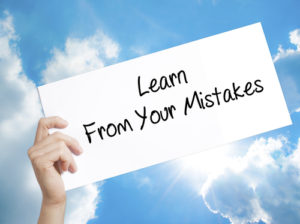Three Steps to Learn From Mistakes Without Shame

My Son's Learning Experience
If you read my article, Natural Consequences Help Kids Learn from Mistakes, you'll know that my son arrived at summer camp without sheets, towels, a blanket or a laundry bag – and I laughed out loud. (I promise it wasn't quite as cruel as that sounds – definitely, read the article if you think I sound like a jerk!)
Since these are basic essentials for most kids to pack for camp, I suspect his first few days might have been a bit uncomfortable. But since he sometimes has a hard time learning from his mistakes, I honestly think he's more likely to learn from this experience than if I had reminded him to bring them.
Article continues below...
Minimize Meltdowns!
Download a free tipsheet "Top 10 Ways to Stop Meltdowns in Their Tracks" to stop yelling and tantrums from everyone!
Emphasis On The Learning
So when he gets home from camp, after a day or two of de-compressing, I'm going to walk him through a simple, three-step process to make sure he locks in the learning from the mistake he made. Not to rub it in his face, but to help his brain track it and register it – so that he's more likely to learn from it for the future.
The key in this process, by the way, is to leave out the blame and shame – to stay "matter-of-fact." Seriously – mistakes happen. That's life. But it's hard to learn from them if you get stuck in a place of judgment, or caught in the emotional baggage of embarrassment and shame.
Three Steps to Learn from Mistakes
1. First, I'll ask him to think about what worked for him when he was packing. Did he look at the camp list? Did he lay his clothes out on the bed? Did he collect everything before he started loading the suitcase? Did he start a week in advance so that he'd have a chance to remember little things?
Key Question: "What Worked?"
2. Then, I'll ask him to think about what did not work for him. Maybe he didn't itemize a list for himself. Maybe he put clothes in the suitcase before he was able to 'see' everything. Maybe he didn't think about what he would need besides clothes and hair products. Maybe he didn't start soon enough.
Key Question: "What Didn't Work?"
3. Finally, I'll ask him to articulate what he plans to do differently in the future. What does he think will help him? Verbalizing it will help to lock in the learning. And it will give us a chance to check out how realistic he is. If he falls into the land of magical thinking and says, "next time, I'll just remember," then I can challenge him a bit to look back at what worked and what didn't – because there's no denying that he slept on a sweatshirt for several days when he really likes a good pillow.
Key Question: "What Will You Do Differently?"
The Solutions Are In The Successes
These three questions are truly a magic process to help kids – or anyone – learn from their mistakes without shame or embarrassment. You can use them when a test score doesn’t come out as expected, or when a recipe you try isn't what you'd hoped for in the kitchen.
One more thing: the essence of learning from mistakes is actually to start with the positive: What Worked? Focus on learning from successes, because the solutions are there! We have a tendency to dive into the depths of failure and despair, but while we need to pay attention to the mistakes, we don't want to dwell there. The solutions are in the successes!
Sanity Is Not Optional
Freaking out? Want to recover your SANITY? We can help you gain the clarity you need. Talk to us and find out HOW!

